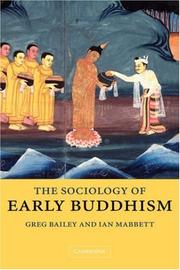| Listing 1 - 1 of 1 |
Sort by
|

ISBN: 1107138965 1280415541 0511180403 0511204493 0511062966 0511326343 0511488289 0511071426 9780511062964 9780511071423 9781280415548 9780511488283 0521831164 9780521831161 0521025214 9780521025218 Year: 2003 Publisher: Cambridge : Cambridge University Press,
Abstract | Keywords | Export | Availability | Bookmark
 Loading...
Loading...Choose an application
- Reference Manager
- EndNote
- RefWorks (Direct export to RefWorks)
Early Buddhism flourished because it was able to take up the challenge represented by buoyant economic conditions and the need for cultural uniformity in the newly emergent states in north-eastern India from the fifth century BCE onwards. This book begins with the apparent inconsistency of Buddhism, a renunciant movement, surviving within a strong urban environment, and draws out the implications of this. In spite of the Buddhist ascetic imperative, the Buddha and other celebrated monks moved easily through various levels of society and fitted into the urban landscape they inhabited. The Sociology of Early Buddhism tells how and why the early monks were able to exploit the social and political conditions of mid-first millennium north-eastern India in such a way as to ensure the growth of Buddhism into a major world religion. Its readership lies both within Buddhist studies and more widely among historians, sociologists and anthropologists of religion.
Buddhism --- Mediation --- Monastic and religious life (Buddhism) --- Monastic and religious life (Lamaism) --- Buddhist monasticism and religious orders --- Religious life --- Buddha and Buddhism --- Lamaism --- Ris-med (Lamaism) --- Religions --- Social aspects --- Religious aspects --- Buddhism. --- 294.3 <09> --- 294.3 <09> Boeddhisme (algemeen)--geschiedenis --- Boeddhisme (algemeen)--geschiedenis --- Social aspects. --- History. --- Bouddhisme --- Conciliation --- Vie religieuse et monastique --- Aspect social --- Aspect religieux --- Arts and Humanities --- Religion --- Buddhism - Social aspects. --- Buddhism - India, Northeastern - History.
| Listing 1 - 1 of 1 |
Sort by
|

 Search
Search Feedback
Feedback About
About Help
Help News
News